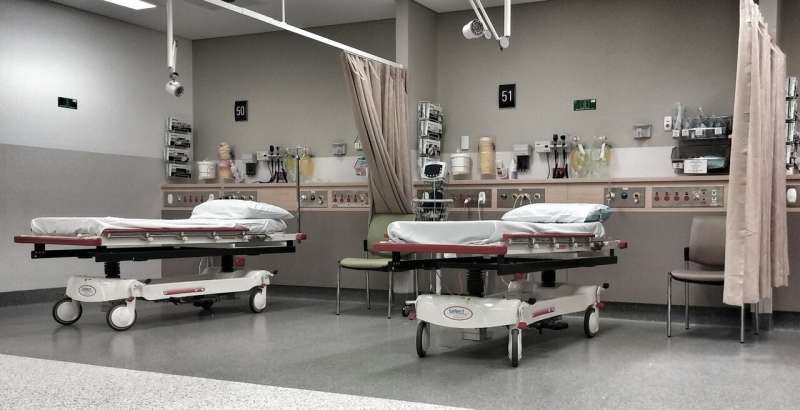This article has been reviewed according to Science X's editorial process and policies. Editors have highlighted the following attributes while ensuring the content's credibility:
fact-checked
trusted source
proofread
Where your bed is in a hospital ward can determine how well you sleep, says study

Hospital patients sleeping near windows sleep better than those in other parts of a ward, according to a new study from the University of Surrey and the University of Padova. Fluctuating noise levels also negatively impact the quality of sleep of patients receiving inpatient hospital treatment.
During this unique study, researchers investigated ways to limit the impact hospitalization has on a patient's circadian rhythmicity. Circadian rhythms are physiological changes that follow a 24-hour cycle and are synchronized by environmental signals, such as light and dark cycles. The study was published in the Journal of Biological Rhythms.
Sara Montagnese, Professor of Chronobiology at the University of Surrey, said, "Hospitalization weakens circadian rhythmicity and the sleep-wake cycle. This can be due to illness or being in an unusual and noisy environment with disordered light, food and activity regimes.
"As a result, patients tend to experience a poor night's sleep, with multiple night awakenings and daytime sleepiness while in hospital. This disturbed sleep may affect their prognosis and how long they have to stay in the hospital.
"It is important that we look for ways to improve the circadian rhythmicity of inpatients to help them sleep better, which could help improve their overall health and their hospital experience."
To investigate whether circadian rhythmicity could improve, 50 inpatients were recruited and underwent a full sleep-wake evaluation. They were also required to complete a daily sleep diary and wear an activity monitor for the duration of their hospitalization. Environmental factors such as room type, bed position, light and noise were recorded.
Patients were then randomly assigned to two groups: the intervention group, known as "Circadian Care," and the control group, referred to as "standard of care."
Those in the Circadian Care group were asked to wear light glasses providing short wavelength enriched morning light immediately after awakening for 45 minutes. They were then asked to wear short wavelength light filter shades from 18:00 until the onset of sleep. Finally, they were provided meals and activity/physiotherapy at times as close as possible to those they were used to at home.
Researchers found that patients in the Circadian Care group tended to go to bed earlier and slept better than at the beginning of their hospitalization.
Environmental factors were also found to play an important role in patients' sleep. Patients sleeping near the window had a significantly higher sleep efficiency (percentage of time spent asleep while in bed) during their hospitalization compared to those sleeping further from the window, emphasizing the importance of the amount of natural light an inpatient is exposed to. Fluctuations in noise levels in the ward were also associated with increased night awakenings.
Professor Montagnese added, "Light plays a critical role in regulating our circadian rhythms. The overabundance of it in hospital settings in the evening may make it more difficult for a person to fall asleep, and the lack of it in the morning may lead to a patient's rhythm becoming delayed or weak. What we have shown is that increasing and decreasing light exposure at the beginning and at the end of the day, respectively, can help.
"Noise is often unavoidable in a busy hospital ward. However, at night, things can perhaps be done to mitigate it, and especially to contain large fluctuations in noise levels. This could be obtained, for example, with educational initiatives aimed at hospital staff, and also with minor changes to the features of equipment, such as medication trolleys, to make them less noisy."
More information: Chiara Mangini et al, Managing Circadian Disruption due to Hospitalization: A Pilot Randomized Controlled Trial of the CircadianCare Inpatient Management System, Journal of Biological Rhythms (2023). DOI: 10.1177/07487304231213916





















